NMJD EXECUTIVE DIRECTOR ELECTED DEPUTY COORDINATOR FOR KIMBERLY PROCESS CIVIL SOCIETY COALITION (KP CSC)
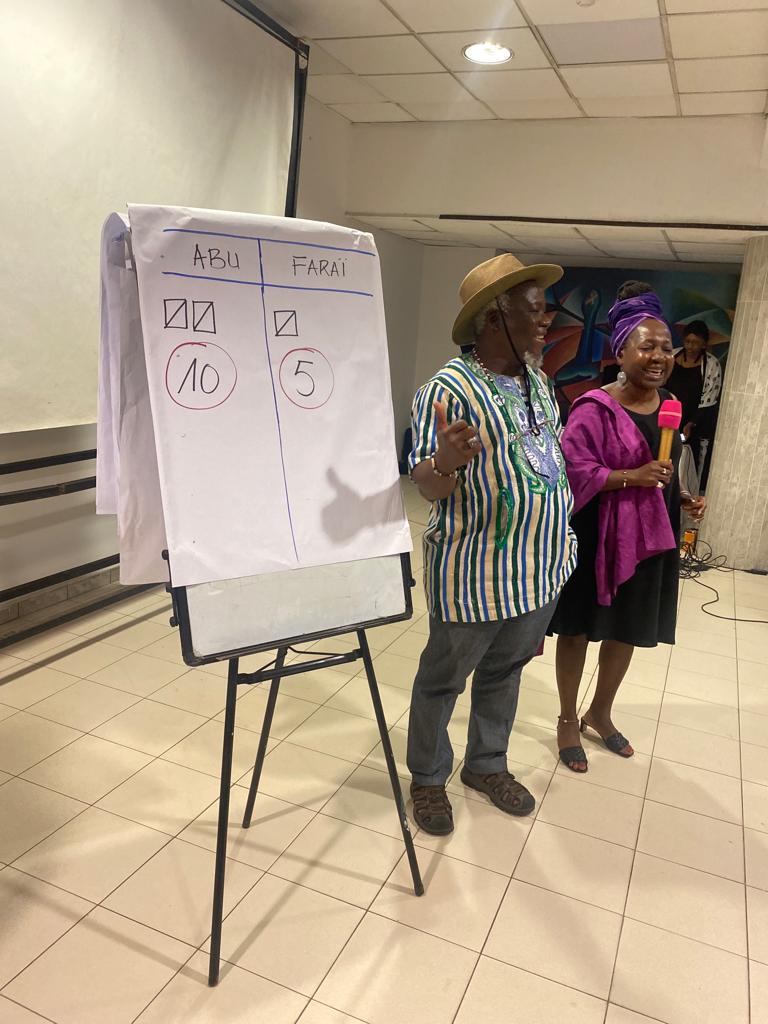
Mr. Abu A. Brima, Executive Director of NMJD, has been elected Deputy Coordinator of the Kimberly Process Civil Society Coalition (KP CSC) for a two-year term at the Annual Coalition General Assembly in Yaoundé, Cameroon. He will then take on the role of substantive Coordinator for another two years.
The KP CSC is the major organisation representing Civil Society interests in supervising the Kimberley Process, with a special focus on improving governance in the diamond business. With a primarily African membership, the group seeks to strengthen governance in diamond extraction and trading by harnessing the expertise and firsthand experiences of communities affected by these operations. They regularly monitor the execution of Kimberley Process laws and provide a grassroots perspective during KP conferences.
The KP CSC advocates for transparency and serves as the spokesman for the Civil Society. Through active engagement in monitoring Kimberley Process compliance and participation in relevant forums, the coalition ensures that the concerns of affected mining communities are heard and considered in decision-making processes.
Opening Statement by Dr. Michel YOBOUE, Civil Society Coalition Coordinator during 2023 Kimberley Process Plenary meeting in Zimbabwe
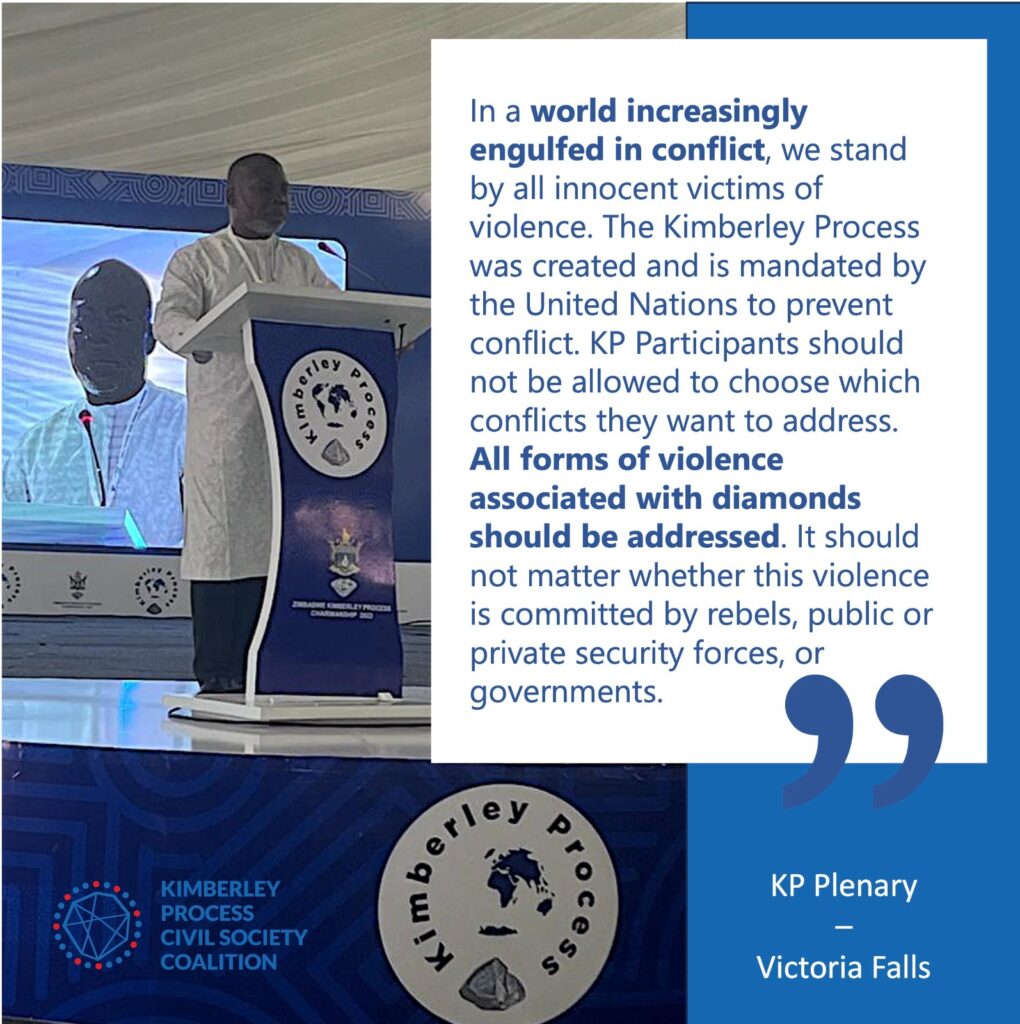
……………………………………………………..
NMJD trains aspiring female politicians in Karena District
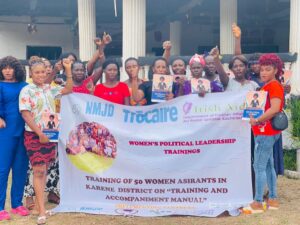
Thanks to Trocaire’s support, our Bombali district team, northern Sierra Leone has successfully completed a week-long training programme for 50 female aspirants in Karene district in two separate sessions – 25 participants in each session.
The programme took the participants through confidence building, how to build the trust of families, friends, and communities in the vision and dream of female aspirants Political patronage and its Consequences, the challenges faced by female aspirants in galvanizing support, and how to tap into networking opportunities.
The training which commenced on the 14 of September 2022 was geared toward promoting and increasing women’s political participation across the country ahead of the June 2023 general elections in Sierra Leone.
NMJD Executive Director Elected as the first Executive Board Chairman of Land for Life Initiative Sierra Leone
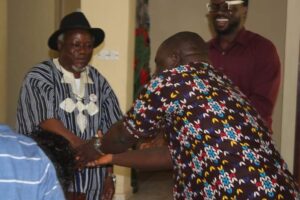
He was elected at the inaugural Board meeting of the land rights advocacy group held in Freetown today, Thursday, July 28, 2022. Abu Brima will use his knowledge of the numerous problems facing the natural resource sector and his huge expertise in advocacy and community mobilisation to provide the needed leadership and support to the L4L Initiative Sierra Leone.
He has been consistently working over the years and contributing towards improving the lives and livelihoods of residents of host mining communities who bear most the brunt of the negative impacts of unresponsive and irresponsible mining activities through improved community beneficiation and sound environmental practices.
CIvil Society Organisations on Kimberly and Diamond meet in Botswana
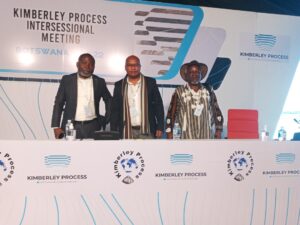 Civil Society Coalition on the Kimberley Process Certification Scheme has concluded a meeting in Kasane, Botswana. This year’s KP 2022 Intersessional Meeting was attended by members from Liberia, Guinea, Côte d’Ivoire, Zimbabwe, Cameroon, Botswana, Lesotho, and Sierra Leone. The meeting which started on Monday, 20th June 2022 ended on Saturday 25th of June 2022.
Civil Society Coalition on the Kimberley Process Certification Scheme has concluded a meeting in Kasane, Botswana. This year’s KP 2022 Intersessional Meeting was attended by members from Liberia, Guinea, Côte d’Ivoire, Zimbabwe, Cameroon, Botswana, Lesotho, and Sierra Leone. The meeting which started on Monday, 20th June 2022 ended on Saturday 25th of June 2022.
Prior to the conference, a two-day preparatory meeting was held among CSOs in which 58 member countries in the diamond industry participated.
The preparatory meeting resulted in the CSOs issuing a preliminary statement on critical issues that they were to follow up on during the meeting proper. The Executive Director of the Network Movement for Justice and Development (NMJD), Mr. Abu A. Brima, also attended the meeting in Botswana.
Kabala CSOs say leadership training workshop timely and relevant
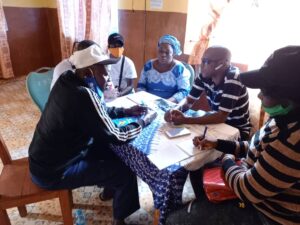 Network Movement for Justice and Development (NMJD) commenced three days DELTA (Development Education Leadership Training for Action) training for civil society leaders in Koinadugu and Falaba districts at the Radio Bintumani Hall in Kabala yesterday, Thursday 5th August 2021. This leadership training for transformation is part of the organization’s ongoing efforts to strengthen civil society leaders with the relevant tools and sharpen their skills to be better leaders in their communities.
Network Movement for Justice and Development (NMJD) commenced three days DELTA (Development Education Leadership Training for Action) training for civil society leaders in Koinadugu and Falaba districts at the Radio Bintumani Hall in Kabala yesterday, Thursday 5th August 2021. This leadership training for transformation is part of the organization’s ongoing efforts to strengthen civil society leaders with the relevant tools and sharpen their skills to be better leaders in their communities.
The objective of the training is to enhance participants’ skills in practicing enabling and transformative leadership skills and promote good human relationships among themselves characterized by team work, effective communication and cooperation.
The training specifically focuses on transformative leadership, Paolo Freire’s concept of liberation, group formation and group dynamics, team building and team work, communication, analytical skills, mobilizing and organizing skills and strategizing for public interest advocacy.
Evaluating the first day’s workshop, Madam Hawa Conteh of the Women’s Advocacy Network (WAN) says the workshop is timely and relevant as it touches on critical issues that are seriously impeding the effectiveness and efficiency of civil society in the two districts.
CSOs meet to asses Government commitment to ensuring Land Rights
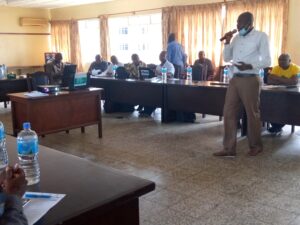 Ahead of the five years report on the Sustainable Development Goals (SDG) Indicators, Civil Society Coalition on Land, Human rights and other natural resources have engaged to assess the progresses made so far in meeting the land right indicator on the SDG which Sierra Leone committed to.
Ahead of the five years report on the Sustainable Development Goals (SDG) Indicators, Civil Society Coalition on Land, Human rights and other natural resources have engaged to assess the progresses made so far in meeting the land right indicator on the SDG which Sierra Leone committed to.
Speaking at the broad based engagement held in Freetown with participants from across the country, Daniel Sesay, member of the coalition representing NAMATI and National advocacy Coalition for Community Legal Empowerment (NaCCLE) said most of the land conflicts that have over the years occurred in Sierra Leone is as a result of obsolete land laws.
He said because of the issues emanating from those laws, came the development of the national land policy to ensure land rights reform, a policy that he said is one of the best in the West African sub region and therefore asked that the policy be transformed into law which will be stronger than a mere policy. Sesay said that was what led to the development of the customary land rights and the land commission’s bill.“We want to have a commission that can handle land rights issues in the country since we do not have confidence in the ministry of Lands, a commission that has the expertise so that the land sector will improve,” he said.
However, he said despite several engagements held with different stakeholders in government, development partners and the Civil Society groups, the documents has been stalled at the Director General’s office at the Ministry of Lands Housing and Country Planning. He said they have also engaged with the new minister of Lands but that nothing has been done in that regard despite promise of reforms by the minister.
Speaking at the event, Abu Brima Executive Director, Network Movement for Justice and Development (NMJD) who doubles as the National Convener for Land Consortium noted that getting the policy into law is what they have been working towards but that much has not been done.
“We have had meetings with the Attorney General and Minister of Justice and so we really do not know why the bills have not yet come out, we are looking forward to it but we are a bit disappointed, very disappointed that for a very long time since the land policy has been developed in 2015, this is the sixth year and we are still crawling to make the laws come into effect and it has multiple effects on land across the country. It has serious implications for land governance across the country,” he said.
He added that as civil society organizations, they will continue to push to let the government know that land issues are not issues to be ignored or neglected. He said that was why they were meeting so that they can do an analysis of what government has done with regards to land governance.
Brima said that the report of the assessment they are doing will be sent to the Global Land Alliance that will be presented as the Civil Society’s assessment of government progresses on the indicators in the region.
“We believe that the alternative report that we are putting together will give them an understanding of what we believe are the issues at stake,” he said.
NMJD Trains platform members on advocacy
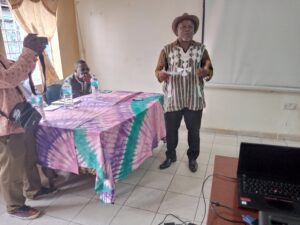 In an effort to boost their advocacy skills, Network Movement for Justice and Development (NMJD) with support from it donor partner ,Oxfam has trained over 40 natural resource rights and economic justice advocates on a new advocacy phenomenon known as ‘Influencing’.
In an effort to boost their advocacy skills, Network Movement for Justice and Development (NMJD) with support from it donor partner ,Oxfam has trained over 40 natural resource rights and economic justice advocates on a new advocacy phenomenon known as ‘Influencing’.
The training held in Freetown on the 31st of May 2021 brought together advocacy platform members from seven districts of Kono, Tonkolili, Bonthe, Moyamba, Kenema and Port Loko.
Speaking at the opening ceremony of the training, Emmanuel Gbondo, the Project Lead for the Economic and Social Justice project said the training was to share knowledge and develop new strategies on how they could improve on their daily advocacy activities to get the duty bearers and the people they advocate for understand their points of view and reach a consensus.
He added that the training will be of great use to the Mining Advocacy (MAPs) Platform members as it will empower them with the basic knowledge to “identify their communal problems and work with other like-minded people and organizations to make a difference in society; putting a problem on the agenda, providing a solution to that problem and building support for acting on both the problem and solution; develop strategies focusing on how to influence decision-making at the community and national levels,” he said.
The Executive Director for NMJD, Abu Augustus Brima said a lot has over the years changed in the mining sector due to the persistence of Civil Society Activists in the country to get the duty bearers to do the right thing in the interest of the communities they advocate for.
He admonished the CSOs present to continue to work in the interest of the people and their communities for whom they were organized. He also cautioned them to be mindful of the fact that they are not policymakers and that they do need the policymakers to achieve their goals.
“And so knowing who we are, we need to make our work very strategic to get the policymakers to trust us so they could listen to our organized point of view,” he said.
In his statement, Oxfam Country Director, John Makina admonished the platform members to engage in evidence-based advocacy by working closely with the communities in which they operate. He noted that in advocacy, there was a need to work with everybody including the people whose voices are more powerful because he said when the communities speak even the duty bearers cannot shut them up.
He said his organization has been working with NMJD to strengthen mining advocacy platforms in mining communities in Sierra Leone. However, he said his organization has been faced with funding constraints exacerbated by the coronavirus pandemic that has forced them to cease operations in 18 countries globally including Sierra Leone, by March 2022.
He however encouraged NMJD and the platform members to continue the good work which he said might attract other donor partners in the event they are gone.
